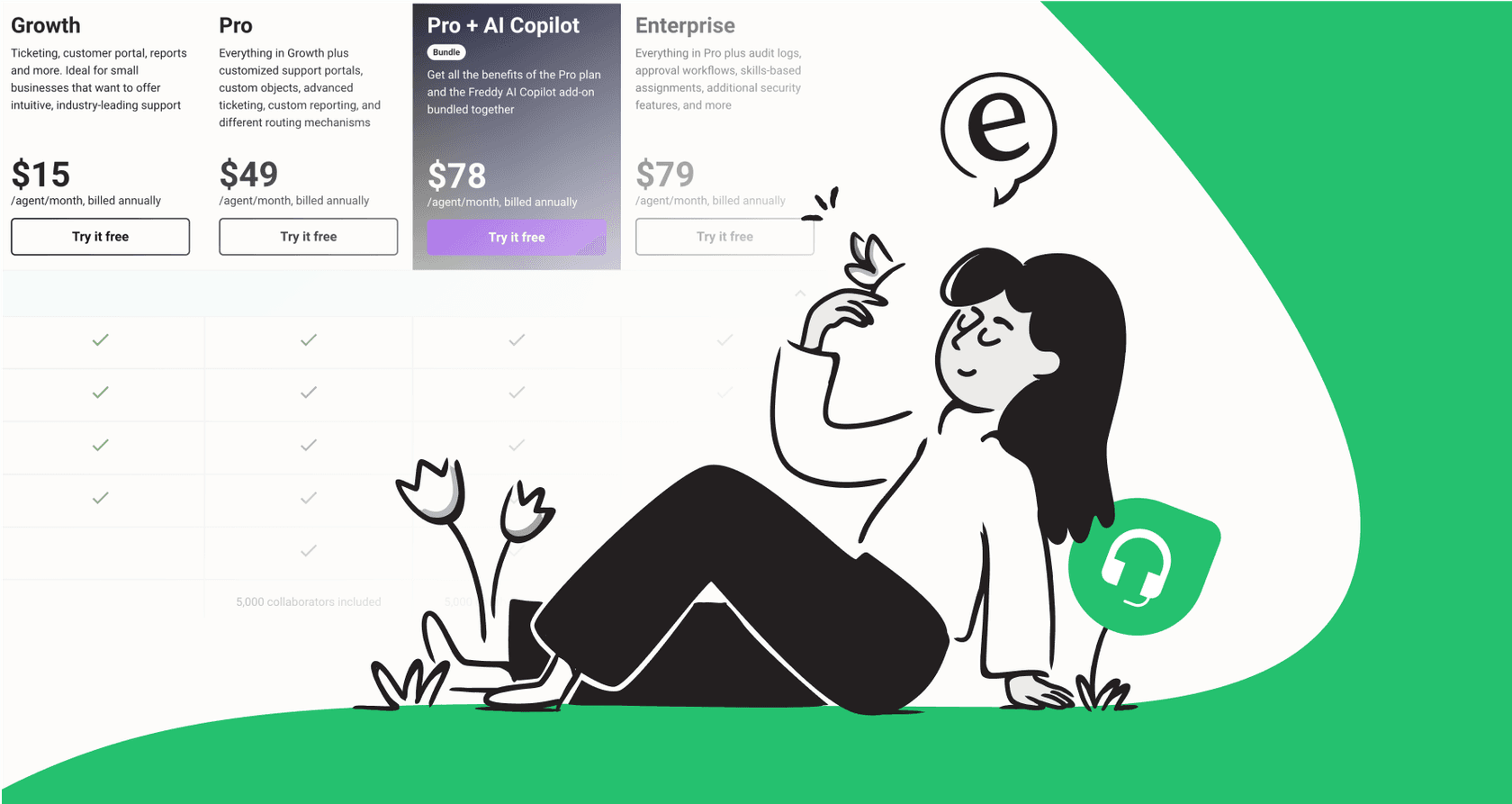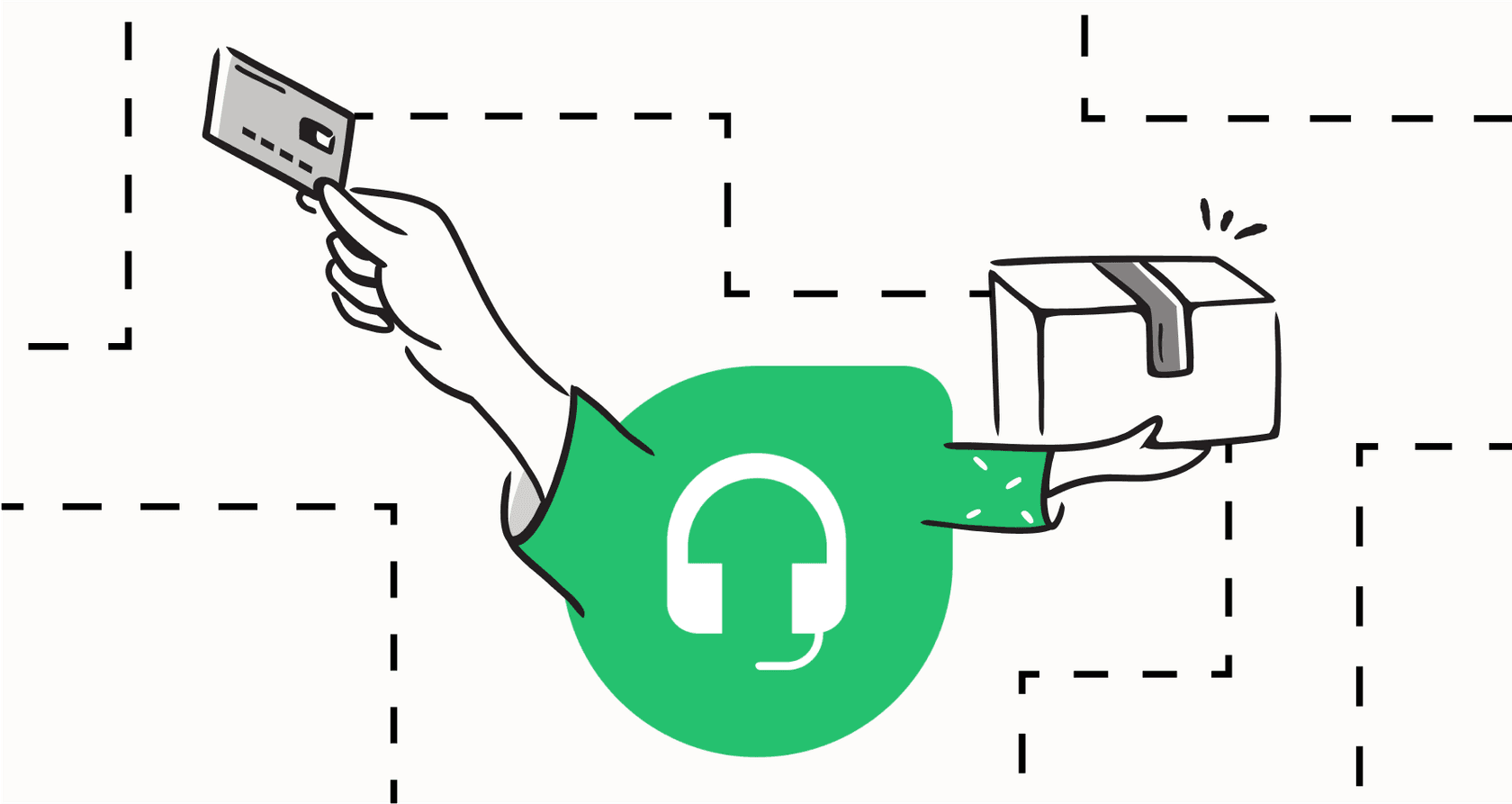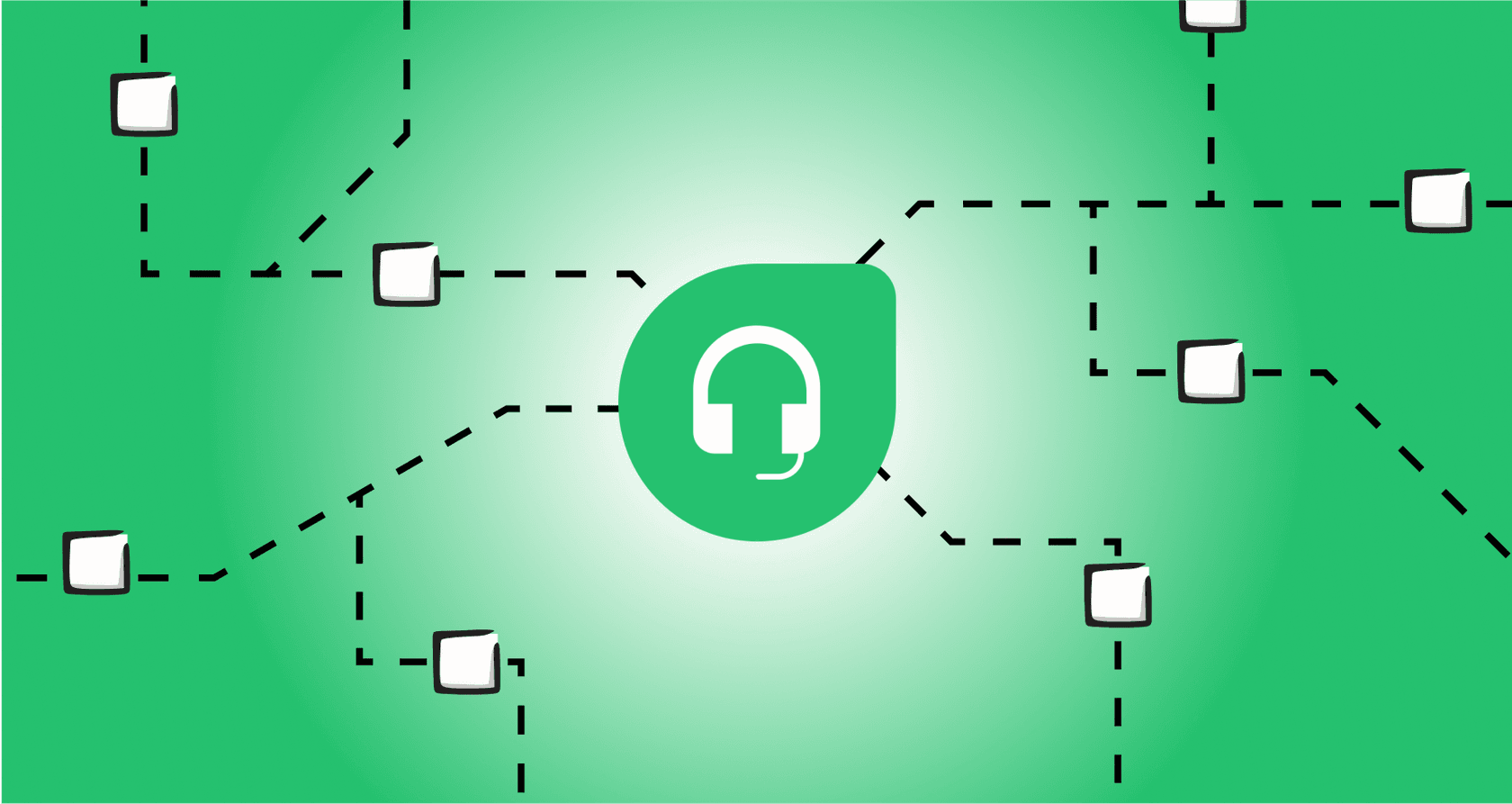A complete Freshdesk plans comparison (2026): Which is right for you?

Stevia Putri

Stanley Nicholas
Last edited January 16, 2026
Expert Verified

Picking a helpdesk is a big decision, and exploring various pricing pages is a key part of the process. You're looking at lists of features, different pricing tiers, and various add-on options, trying to figure out what's essential for your specific workflow. When you find the right fit, your team becomes a well-oiled machine. It's a choice that helps you manage your budget, support your team's productivity, and ultimately, ensure your customers remain happy.
Lots of teams use Freshdesk, as it offers a robust range of tiers to match different team sizes. To find the right fit, it helps to look closely at what each level provides. This guide is a straightforward Freshdesk plans comparison to help you do just that. We'll walk through each plan, from the free version all the way to the enterprise level, and we’ll also look at how its AI options work so you can make a choice that fits your needs perfectly in 2026.
Understanding Freshdesk
So, what is Freshdesk, really? At its core, it's a powerful customer support tool made by Freshworks. Think of it as command central for every single customer conversation.
Imagine the usual challenge: your team might be managing a shared email inbox, social media messages, phone calls, and live chat. Freshdesk helps organize this by pulling every conversation into one tidy dashboard.

Its main capability is turning every customer question, no matter where it comes from, into a numbered "ticket." This simple step is highly effective because it lets your agents track the problem from the moment it comes in until it's fully resolved.
But it's not just about tickets. Freshdesk also gives you tools to build a self-service knowledge base, which provides a help center where customers can find their own answers 24/7. Plus, it has automation features to handle repetitive tasks, like routing a ticket to the right department. The whole point is to make your support team's job more organized and your customers' experience a lot smoother.
Freshdesk plans comparison: A detailed breakdown
This is where we get into the details. Freshdesk has a plan for just about every type of company, from a brand-new startup to a huge corporation. Let’s break down the value offered by each one.
The free plan: Getting your feet wet
-
Cost: $0, for up to 2 agents.
-
Ideal for: Solopreneurs, tiny startups, or anyone who's been handling support from a personal inbox and wants to get more organized.
-
Key features: You get the bare essentials to manage customer conversations. This includes ticketing from email and social media (Facebook and X/Twitter), a basic knowledge base you can set up for customers, and a few tools to help your small team collaborate effectively.
-
Considerations: The free plan is a great starting point for those new to helpdesks. As you grow, you may eventually reach the capacity of the free tier, which is capped at two agents and focuses on essential ticketing. It’s designed to provide a solid foundation as you begin your journey.
The paid plans: Growth, Pro, and Enterprise
If you're looking for more advanced support features, you'll likely consider one of Freshdesk's three paid plans. Each level unlocks more power for automation, reporting, and customization. Here’s a quick look at how they stack up.
| Feature | Growth plan ($15/agent/mo) | Pro plan ($49/agent/mo) | Enterprise plan ($79/agent/mo) |
|---|---|---|---|
| Core ticketing | Automation, Marketplace apps, SLA management | Everything in Growth + custom roles, multilingual support | Everything in Pro + skill-based routing, Sandbox |
| AI capabilities | Freddy AI Copilot is an add-on ($29/agent/mo) | Freddy AI Copilot is an add-on ($29/agent/mo) | Freddy AI Copilot is an add-on ($29/agent/mo) |
| Freddy AI Agent | 500 free sessions, then $100/1000 sessions | 500 free sessions, then $100/1000 sessions | 500 free sessions, then $100/1000 sessions |
| Reporting | Helpdesk reports, CSAT surveys | Custom reports & dashboards | Audit logs, advanced metrics |
| Customization | Basic branding | Custom ticket fields, custom apps | Custom agent roles, IP whitelisting |
| Ideal user | Small teams needing to automate the basics. | Growing businesses with more complex needs. | Large companies that need advanced security and control. |
Diving into the Growth plan
The Growth plan is the first paid step and it’s for teams who are ready to scale beyond the basics. If your crew is starting to see an increase in ticket volume, this is your stop. It introduces some really important features like SLA management, which lets you set and track response time goals. It also adds collision detection, a great feature that helps ensure agents don't work on the same ticket simultaneously. Plus, you get access to the Freshworks Marketplace to connect with other tools in your stack.
Diving into the Pro plan
The Pro plan is often the sweet spot for businesses that are really starting to scale. This is where you get to truly customize Freshdesk to your liking. It’s built for teams that are getting more organized and have more complex needs. For example, if you have different roles that need specific permissions, or you serve customers in different languages, the Pro plan handles all of that with features like custom agent roles, a multilingual knowledge base, and custom dashboards.

Diving into the Enterprise plan
Just like it sounds, the Enterprise plan is for the big leagues. This tier is designed for large-scale support operations that need significant control, security, and efficiency. It introduces smart features like skill-based routing, which can automatically send a complex technical ticket to your most experienced specialist. You also get a "Sandbox" where you can test out new workflows and automations safely. It’s the most comprehensive offering Freshdesk has.
Understanding Freshdesk's AI options
Freshdesk offers a specialized AI engine, "Freddy AI," which is built to work seamlessly within the platform. When reviewing your plan, it's helpful to understand how these features are structured.
Freshdesk offers AI as a flexible add-on, allowing you to choose exactly what you need. The AI Copilot, which helps agents write replies and summarize conversations, is available for $29 per agent monthly. Then there’s the AI Agent, which can handle tickets automatically using a usage-based model. You get a set amount of free sessions, with additional sessions available as needed, which is great for scaling during busy periods.

Freddy AI is expertly designed to focus on what's inside your Freshdesk account, such as your tickets and help articles. This deep focus ensures it is highly specialized in your primary support data.
For teams that also rely on information stored in other platforms - like technical documentation in Confluence, checklists in Google Docs, or quick fixes shared in Slack - you can enhance your Freshdesk experience with a complementary tool like eesel AI. eesel AI works alongside Freshdesk to connect to all of your company's knowledge.
-
Set it up in minutes: You can connect your helpdesk, knowledge bases, and other apps with a few clicks in a completely self-serve way.
-
Bring all your knowledge together: You can train your AI on help articles and tickets, but also on everything in your external sources like Notion, SharePoint, and more, giving your team a full 360-degree view.
-
Clear, simple pricing: With eesel AI, pricing is straightforward and based on usage, helping you plan your budget effectively.
How to pick the right Freshdesk plan
To make the final call, think about where your team is right now and your goals for 2026.
-
Is it just you and maybe one other person? If so, the free plan is the perfect way to start without any risk. It's a great way to experience the platform as you begin to organize your support.
-
Is manual work starting to slow you down? If you're spending more time assigning tickets or typing out repetitive replies, it’s a good time to move to the Growth plan. The automation features will bring a significant boost to your productivity.
-
Is your support getting more complicated? If you’re expanding globally or have different teams handling specialized issues, the Pro plan has the advanced tools you need to manage that complexity with ease.
-
Do you need top-tier security and control? If you're a larger company with strict compliance needs and a desire for intelligent ticket routing, the Enterprise plan is built specifically for your scale.
Finding the right plan is about more than features
This Freshdesk plans comparison shows a clear and scalable path for any business. You can start for nothing, add automation when you need it with the Growth plan, get more control with Pro, and access high-end enterprise features when the time is right. Freshdesk is a mature, reliable platform that has built an impressive ecosystem.
Today's support teams often use knowledge that’s located in various places. While Freddy AI provides an excellent specialized focus on your helpdesk data, you can further empower your team by using complementary tools that see the whole picture.
So, before you lock into a plan, consider how you want to manage your company's collective knowledge.
Ready to see how a complementary AI can work with your Freshdesk setup? Try eesel AI for free and connect it to your Freshdesk account in minutes.
Frequently asked questions
For small startups or solo operations, the Free plan is an excellent starting point. It allows up to two agents to manage basic ticketing and a knowledge base without any cost, letting you organize support effectively before needing to invest.
A key difference is that Freshdesk's Freddy AI Copilot is an add-on across all paid plans, and the AI Agent sessions are usage-based. Freddy AI is highly specialized in accessing knowledge within Freshdesk, providing a deep focus on your helpdesk data.
You've likely outgrown the Free plan if you need more than two agents, require automation to handle repetitive tasks, or need to track performance with service level agreements (SLAs). The Growth plan typically addresses these initial scaling challenges.
The Pro plan is ideal for growing businesses as it introduces crucial features like custom agent roles, multilingual support, and custom reports. These allow for greater customization and better management of diverse teams and customer bases compared to the Growth plan.
The Enterprise plan offers advanced features vital for large organizations, such as skill-based routing for efficient ticket distribution, a Sandbox environment for testing, and robust audit logs for security and compliance. It provides the highest level of control and scalability.
If advanced AI is a priority, you can opt for a mid-tier Freshdesk plan and integrate a separate, complementary AI solution like eesel AI. This allows you to draw knowledge from all your company's platforms, enhancing your existing Freshdesk setup with even more functionality.
Share this post

Article by
Stevia Putri
Stevia Putri is a marketing generalist at eesel AI, where she helps turn powerful AI tools into stories that resonate. She’s driven by curiosity, clarity, and the human side of technology.





